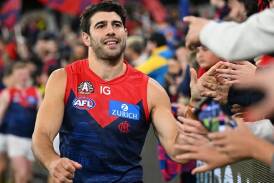
Blanket bans on transgender women athletes risks violating fundamental human rights principles, Australian human rights groups warn.
Subscribe now for unlimited access.
$0/
(min cost $0)
or signup to continue reading
The caution comes on the heels of a vote from the World Athletics Council banning transgender women from female events in elite track and field competitions.
Equality Australia CEO Anna Brown said the new regulations announced early on Friday risked violating international human rights principles of non-discrimination.
The new regulations will cut in half the testosterone level allowed for athletes with differences in sex development that could keep them from competing in female events.
"Intersex variations in the female population are a naturally occurring part of our physical diversity," Ms Brown said.
The ban follows a similar decision taken by other sports, including swimming last year, to bar athletes who have transitioned from male to female and have gone through male puberty.
Trans Justice Project director Jackie Turner called the move a political decision to give anti-trans lobbyists what they want, rather than doing what is right.
World Athletics noted in a statement there were currently no transgender athletes competing at international level and consequently no athletics-specific evidence of the impact these athletes would have on the fairness of female competition in athletics.
Ms Turner said the discriminatory ban set a dangerous precedent and was not supported by the latest scientific research.
"The fact is that women's bodies, like all human bodies, are diverse," she said.
Defending the ban, World Athletics president Sebastian Coe said the decision to exclude transgender women who had gone through male puberty was based on the overarching need to protect the female category.
Some athletes, including Olympic British track and field athlete Emily Diamond, welcomed the decision over social media, saying the ban was "leading the fight for fairness in women's sport".
Others, including transgender Canadian cyclist Kristen Worley who successfully legally challenged the gender policies of the International Olympic Committee (IOC), called the ban "disheartening and disappointing."
The athlete in a Twitter post also accused World Athletics of "purposely misleading (the) public".
Ms Brown said given the minuscule number of trans athletes playing in any sport, the international principle of proportionality justified taking a case-by-case approach rather than imposing a blunt and harmful ban on everyone.
National lobby and advocacy group Just.Equal Australia also called for a case-by-case approach, saying trans and intersex women are now being ostracised from sport.
"Simply using testosterone as the only measure to determine participation is simplistic, discriminatory and fails to consider all aspects of the situation," spokeswoman Sally Goldner said.
The rules, which come into effect March 31, could impact athletes such as South Africa's Caster Semenya, a two-time Olympic 800 metre champion who is believed to have an intersex condition that causes her body to produce testosterone at a higher rate than in most women.
Semenya has been barred from the 800 metre event since 2019 and will now have to undergo hormone-suppressing treatment for six months before competing to be eligible for events outside the restricted range of 400m through one mile.
Australian Associated Press





